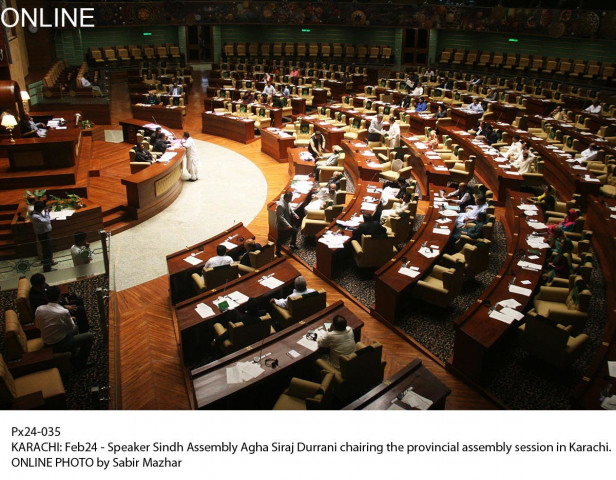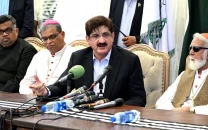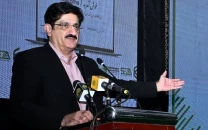At long last: Sindh Assembly finally passes LG bill
The condition that bound candidates to contest the elections through panels has been abolished.

Speaker Sindh Assembly Agha Siraj Duranni chairing the provincial assembly session in Karachi. PHOTO: ONLINE
The Sindh Assembly finally passed the ‘Sindh Local Government (Amendment) Bill, 2015’ on Tuesday.
The law has allegedly been adopted to ‘appease’ the Muttahida Qaumi Movement (MQM), claim some of the lawmakers, as well as to comply with the Supreme Court’s orders. A total of 10 amendments have been made to the original draft of the local government law that was passed by the Assembly in 2013.
As per the most recent amendments, the condition that bound candidates to contest the elections through panels has been abolished. Meanwhile, the ward, a basic unit to contest the elections in union councils (in rural areas) or union committees (urban areas) has been introduced once again. Each union council will comprise four wards. This particular provision was earlier excluded by the PPP government at the time of legislation in 2013 — a move that had prompted the MQM to challenge it in court.
The assembly also made an amendment to change the minimum population that would comprise a UC. “Earlier, a union council comprised 10,000 to 50,000 people. The number has now been revised to 40,000 to 50,000 people,” states the bill.
The new law also states that the “the chairperson and vice-chairperson will contest joint elections in the respective union councils. Four general councillors will be elected from each ward — one woman, one labourer or peasant and one non-Muslim member — will contest in each UC.” In the earlier version of the law, there was no provision for the chairperson or vice-chairperson to contest the elections directly; rather, the councilors were to elect the chairperson and vice-chairperson.”
Minister for parliamentary affairs Dr Sikandar Mandhro said, “The amendment to the law is being made for the purpose of local government elections, empowering the election commission, which will now have to delimit the councils, committees and wards.”
Though the government claims to have devolved its powers to the election commission, there is still confusion. “The government will issue a notification determining the number of union councils, committees and wards in municipal committees, town committees. Additionally, the government after inviting objections from the residents will notify the status of such councils accordingly.”
Pakistan Muslim League — Functional‘s Nand Kumar moved an amendment to surrender these powers to the election commission too. “On one hand, you are talking about devolving the delimitation powers to the election commission while, on the other, you are going to retain the power to issue the notification determining the number of union councils in talukas and invite objections on your own,” he said. “Why are you creating this confusion?” he questioned, while moving three different amendments. All his amendments were rejected by the House.
Speaking in defence of the draft, Dr Mandhro said, “It is the Sindh government’s authority to issue the notification determining the number of union councils. The election commission will have the authority to do so at the time of local government elections but the powers rest with the Sindh government otherwise.”
Include religious literature for minorities’ students
The Sindh Assembly unanimously adopted a resolution to include religious literature in the academic curriculum for minorities’ students and appoint teachers to teach these subjects to Hindus, Christians and member of other minority communities.
The resolution, tabled by PML-F parliamentary leader Nand Kumar said that religious literature of the minorities was part of the curriculum in Sindh until the 1970s, when the then military ruler General Ziaul Haq ordered for it to be removed. “Students belonging to the Hindu community have no option but to study Islamiat,” he said. “We demand lawmakers of other parties to support this resolution so that our children can learn about their own religion,” he said. Education Minister Nisar Ahmed Khuhro announced that he will consider the idea.
Meanwhile, the assembly also passed a bill to regulate matters relating to the insurance of public property. Muttahida Qaumi Movement (MQM) and members of other opposition parties opposed the bill calling it a hasty legislation. Moving the bill, parliamentary affairs minister Dr Sikandar Mandhro said, “We are making this law in light of the 18th Amendment. Currently, we are paying a premium to the national insurance company with respect to the insurance of public property but, after this law, the provincial government will manage it by itself.”
Although the MQM and PML-F MPAs expressed several reservations, the law was passed by the assembly.
Published in The Express Tribune, February 25th, 2015.



















COMMENTS
Comments are moderated and generally will be posted if they are on-topic and not abusive.
For more information, please see our Comments FAQ